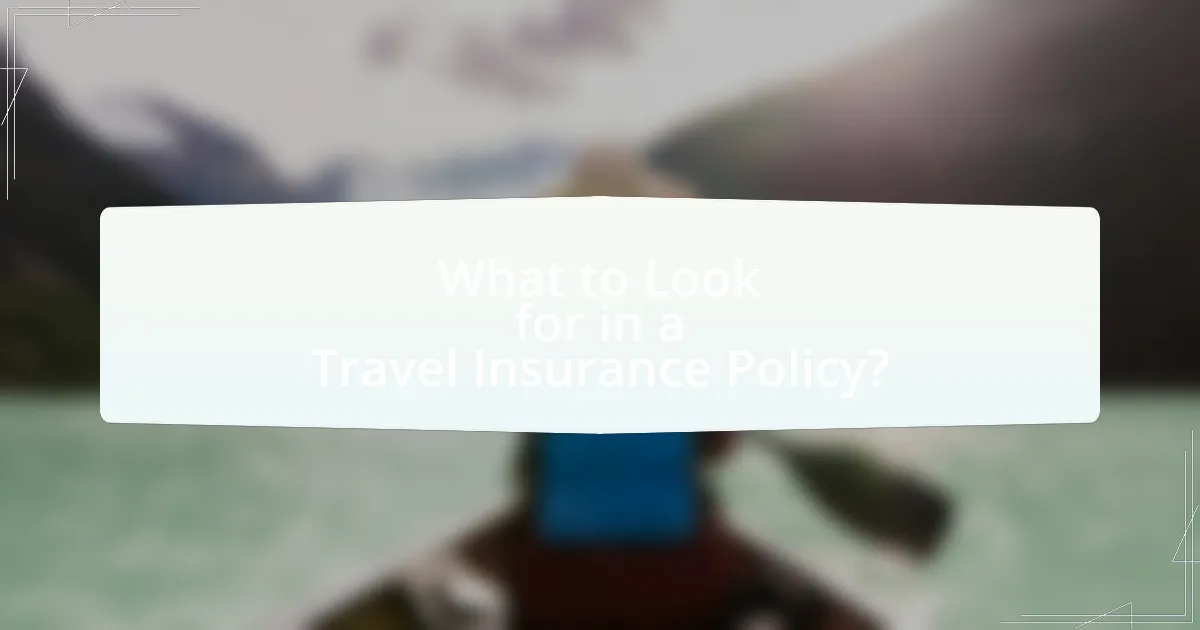Travel insurance is a crucial financial safeguard for travelers, covering risks such as trip cancellations, medical emergencies, and lost luggage. This article outlines the importance of travel insurance, detailing its key components, including trip cancellation, medical coverage, and baggage insurance. It also discusses how to assess individual travel insurance needs based on factors like destination, trip duration, and personal health. Additionally, the article provides guidance on selecting the right policy, evaluating coverage limits, and avoiding common pitfalls when purchasing travel insurance, ensuring travelers are adequately protected during their journeys.

What is Travel Insurance and Why is it Important?
Travel insurance is a type of insurance designed to cover various risks associated with traveling, including trip cancellations, medical emergencies, lost luggage, and other unforeseen events. It is important because it provides financial protection and peace of mind, ensuring that travelers can manage unexpected situations without incurring significant out-of-pocket expenses. For instance, according to the U.S. Travel Insurance Association, nearly 30% of travelers experience a trip disruption, highlighting the necessity of having coverage to mitigate potential losses.
How does Travel Insurance work?
Travel insurance works by providing financial protection against unexpected events that may occur during a trip, such as trip cancellations, medical emergencies, lost luggage, or travel delays. When a traveler purchases a policy, they pay a premium in exchange for coverage that can reimburse costs or provide assistance in the event of covered incidents. For example, according to the U.S. Travel Insurance Association, approximately 30% of travelers purchase travel insurance, highlighting its importance in mitigating financial risks associated with travel.
What are the key components of Travel Insurance?
The key components of travel insurance include trip cancellation coverage, medical expense coverage, baggage loss or delay coverage, and emergency evacuation coverage. Trip cancellation coverage reimburses travelers for non-refundable expenses if they need to cancel their trip due to covered reasons, such as illness or natural disasters. Medical expense coverage pays for medical treatment received while traveling, which is crucial as health insurance may not cover international care. Baggage loss or delay coverage compensates travelers for lost or delayed luggage, ensuring they can replace essential items. Emergency evacuation coverage provides transportation to a medical facility in case of serious illness or injury, which can be costly without insurance. These components collectively protect travelers from financial losses and unexpected events during their trips.
How do these components protect travelers?
Travel insurance components protect travelers by providing financial coverage for unexpected events such as trip cancellations, medical emergencies, and lost belongings. For instance, trip cancellation coverage reimburses non-refundable expenses if a traveler must cancel due to unforeseen circumstances like illness or natural disasters. Medical coverage ensures that travelers receive necessary medical treatment abroad without incurring exorbitant out-of-pocket costs, which can average thousands of dollars for emergency care. Additionally, coverage for lost or stolen belongings helps travelers recover the value of their possessions, reducing the financial impact of theft or loss. These components collectively mitigate risks associated with travel, ensuring that travelers can manage unforeseen challenges effectively.
What types of Travel Insurance are available?
There are several types of travel insurance available, including trip cancellation insurance, medical coverage, baggage insurance, and travel accident insurance. Trip cancellation insurance reimburses travelers for non-refundable expenses if they need to cancel their trip due to unforeseen circumstances, such as illness or emergencies. Medical coverage provides financial protection for medical expenses incurred while traveling, which is crucial for international trips where health care costs can be high. Baggage insurance covers loss, theft, or damage to personal belongings during travel, ensuring that travelers are compensated for their losses. Travel accident insurance offers benefits in the event of accidental death or dismemberment while traveling. Each type of travel insurance serves a specific purpose, allowing travelers to choose coverage that best fits their needs.
What is Trip Cancellation Insurance?
Trip Cancellation Insurance is a type of insurance that reimburses travelers for non-refundable expenses if they need to cancel their trip due to covered reasons, such as illness, injury, or unforeseen events. This insurance typically covers costs like airfare, hotel reservations, and other pre-paid travel expenses, ensuring that travelers do not suffer financial loss due to unexpected cancellations. According to the Insurance Information Institute, trip cancellation insurance can provide peace of mind and financial protection, making it a valuable consideration for travelers planning their trips.
What does Medical Coverage in Travel Insurance include?
Medical coverage in travel insurance typically includes expenses related to emergency medical treatment, hospitalization, and medical evacuation. This coverage ensures that travelers receive necessary medical care while abroad, including doctor visits, surgeries, and prescription medications. Additionally, it may cover costs associated with repatriation of remains in the event of death. According to the U.S. Travel Insurance Association, comprehensive travel insurance plans often provide up to $1 million in medical coverage, depending on the policy.
How does Baggage Insurance work?
Baggage insurance provides financial protection against loss, theft, or damage to personal belongings while traveling. When a traveler purchases baggage insurance, they typically receive coverage for specific items, such as luggage, electronics, and clothing, up to a predetermined limit. In the event of a claim, the insured must report the incident to the insurance provider and provide necessary documentation, such as receipts and police reports, to substantiate the loss. According to the Insurance Information Institute, many travel insurance policies include baggage coverage as part of a comprehensive plan, ensuring travelers can recover costs associated with their lost or damaged belongings.

How to Assess Your Travel Insurance Needs?
To assess your travel insurance needs, first evaluate the specific risks associated with your trip, including destination, activities, and personal health. For instance, if traveling to a country with high medical costs or engaging in adventure sports, comprehensive coverage is essential. Additionally, consider the duration of your trip and any pre-existing medical conditions, as these factors influence the type of coverage required. According to the U.S. Travel Insurance Association, 41% of travelers purchase insurance primarily for medical coverage, highlighting its importance. By analyzing these elements, you can determine the appropriate level of coverage to protect against potential financial losses during your travels.
What factors should you consider when choosing Travel Insurance?
When choosing travel insurance, consider coverage options, policy limits, exclusions, and customer service. Coverage options should include medical expenses, trip cancellation, and lost luggage, as these are common travel risks. Policy limits define the maximum amount the insurer will pay, which is crucial for ensuring adequate financial protection. Exclusions detail what is not covered, so understanding these can prevent unexpected costs. Lastly, customer service quality is important for assistance during emergencies, as a responsive insurer can significantly impact your travel experience.
How does your destination affect your Travel Insurance choice?
Your destination significantly influences your travel insurance choice by determining the level of risk associated with health, safety, and legal issues. For instance, traveling to countries with high medical costs, such as the United States, necessitates comprehensive coverage that includes high medical limits and emergency evacuation. Conversely, destinations with lower healthcare costs may allow for more basic coverage. Additionally, regions prone to natural disasters or political instability require policies that cover trip cancellations and interruptions. According to the U.S. Department of State, travelers to certain countries may also need to consider specific exclusions or requirements in their insurance policies, reinforcing the importance of aligning coverage with destination-specific risks.
What is the significance of the duration of your trip?
The duration of your trip is significant because it directly influences the type and level of travel insurance coverage you need. Longer trips typically involve greater risks, such as increased chances of illness or accidents, which necessitate more comprehensive insurance policies. For example, a study by the Insurance Information Institute indicates that travelers on trips longer than two weeks are more likely to encounter unexpected events, making it essential to select insurance that covers extended stays and potential emergencies.
How do your personal health and activities influence your Travel Insurance selection?
Personal health and activities significantly influence Travel Insurance selection by determining the level of coverage needed for potential medical expenses and risks associated with specific activities. Individuals with pre-existing health conditions may require policies that offer comprehensive medical coverage, including emergency evacuation and treatment for those conditions. Additionally, travelers engaging in high-risk activities, such as skiing or scuba diving, should select insurance that specifically covers injuries related to those activities, as standard policies may exclude them. According to a survey by the Insurance Information Institute, 40% of travelers reported that their health status directly impacted their choice of travel insurance, highlighting the importance of aligning coverage with personal health and activity levels.
What pre-existing conditions should you disclose?
You should disclose any pre-existing conditions that could affect your health during travel, including chronic illnesses, recent surgeries, or ongoing treatments. Insurance providers typically require this information to assess risk and determine coverage eligibility. For instance, conditions such as diabetes, heart disease, asthma, and mental health disorders are crucial to disclose, as they may influence the likelihood of needing medical assistance while traveling. Failure to disclose these conditions can result in denied claims or cancellation of coverage, as many travel insurance policies have specific clauses regarding pre-existing conditions.
How do adventure activities impact your coverage options?
Adventure activities significantly impact your coverage options by often requiring specialized travel insurance that includes higher risk activities. Standard travel insurance policies may exclude coverage for injuries or incidents that occur during activities such as skydiving, scuba diving, or rock climbing. According to a survey by the Insurance Information Institute, 60% of travelers engaging in adventure sports reported needing additional coverage to ensure protection against potential accidents. Therefore, individuals planning to participate in adventure activities should seek policies specifically designed to cover these risks, ensuring they are adequately protected during their travels.

What to Look for in a Travel Insurance Policy?
When selecting a travel insurance policy, it is essential to look for coverage that includes trip cancellation, medical expenses, and emergency evacuation. Trip cancellation coverage protects against financial loss if you need to cancel your trip due to unforeseen circumstances, such as illness or natural disasters. Medical expenses coverage ensures that you are financially protected in case of illness or injury while traveling, which is crucial given that healthcare costs can be exorbitant abroad. Emergency evacuation coverage is vital for situations requiring immediate transport to a medical facility, especially in remote areas. According to the U.S. Travel Insurance Association, 1 in 6 travelers experiences a trip interruption, highlighting the importance of comprehensive coverage.
How can you evaluate the coverage limits of a policy?
To evaluate the coverage limits of a policy, review the policy document for specific coverage amounts and exclusions. Coverage limits define the maximum amount an insurer will pay for a covered loss, which can vary by type of coverage, such as medical expenses, trip cancellation, or baggage loss. For instance, a travel insurance policy may have a medical coverage limit of $100,000, meaning the insurer will cover medical expenses up to that amount. Additionally, compare these limits against your potential risks and needs, such as the cost of medical care in your travel destination or the value of your belongings. This ensures that the coverage aligns with your travel plans and financial exposure.
What are the common exclusions in Travel Insurance policies?
Common exclusions in travel insurance policies typically include pre-existing medical conditions, injuries sustained while participating in high-risk activities (such as extreme sports), and losses due to travel disruptions caused by natural disasters or pandemics. Additionally, many policies exclude coverage for incidents related to alcohol or drug use, as well as losses incurred while traveling to destinations with travel advisories or warnings issued by government authorities. These exclusions are standard across many insurance providers, reflecting the need to manage risk and limit liability.
How do deductibles affect your Travel Insurance costs?
Deductibles directly influence the cost of travel insurance premiums, with higher deductibles typically resulting in lower premiums. This relationship exists because when a policyholder agrees to pay a larger portion of any claim out-of-pocket, the insurer assumes less risk, which allows them to charge a lower premium. For example, a travel insurance policy with a $1,000 deductible may cost significantly less than one with a $250 deductible, as the insurer is more likely to incur costs with the lower deductible. Thus, choosing a deductible level is a crucial factor in determining overall travel insurance costs.
What should you check regarding the insurer’s reputation?
You should check the insurer’s financial stability, customer reviews, and claims settlement history. Financial stability can be assessed through ratings from agencies like A.M. Best or Standard & Poor’s, which indicate the insurer’s ability to pay claims. Customer reviews on platforms such as Trustpilot or Consumer Affairs provide insights into the experiences of policyholders. Additionally, examining the claims settlement history reveals how efficiently and fairly the insurer processes claims, which is crucial for understanding their reliability.
How can customer reviews inform your decision?
Customer reviews can significantly inform your decision by providing insights into the experiences of others who have used a specific travel insurance policy. These reviews often highlight the strengths and weaknesses of coverage options, claims processes, and customer service quality. For instance, a study by the Pew Research Center found that 82% of consumers read online reviews before making a purchase, indicating the influence of peer feedback on decision-making. By analyzing customer reviews, potential buyers can gauge the reliability and effectiveness of different travel insurance providers, ultimately leading to a more informed choice that aligns with their specific needs and expectations.
What role does the insurer’s financial stability play?
The insurer’s financial stability is crucial as it determines the company’s ability to pay claims. A financially stable insurer is more likely to fulfill its obligations during times of high claims, such as natural disasters or widespread travel disruptions. For instance, insurers with strong financial ratings from agencies like A.M. Best or Standard & Poor’s are statistically less likely to face insolvency, ensuring that policyholders receive their benefits when needed. This stability provides peace of mind to travelers, knowing that their coverage is reliable and that they will be compensated for losses incurred during their trips.
What are the best practices for purchasing Travel Insurance?
The best practices for purchasing travel insurance include assessing your specific needs, comparing different policies, and reading the fine print. First, identify the coverage you require based on your trip type, such as medical emergencies, trip cancellations, or lost luggage. Next, use comparison tools to evaluate various insurance providers, focusing on coverage limits, exclusions, and premiums. Finally, thoroughly review the policy details to ensure you understand the terms, conditions, and claims process, as this can prevent issues during your travels. According to the Insurance Information Institute, understanding these factors can significantly enhance your travel experience and provide peace of mind.
How far in advance should you buy Travel Insurance?
You should buy travel insurance as soon as you book your trip. Purchasing travel insurance early ensures coverage for potential issues like trip cancellations or interruptions that may arise before your departure. Many policies offer benefits such as coverage for pre-existing medical conditions if purchased within a certain timeframe after booking, typically within 14 to 21 days. This early purchase can provide peace of mind and financial protection against unforeseen circumstances.
What tips can help you compare different policies effectively?
To compare different travel insurance policies effectively, start by identifying key coverage areas such as medical expenses, trip cancellation, and baggage loss. Evaluating these areas allows you to understand the extent of protection each policy offers. Additionally, consider the policy limits and exclusions, as these can significantly impact your coverage. For instance, a policy may cover medical expenses up to a certain limit, but if your needs exceed that, you may face out-of-pocket costs. Furthermore, reviewing customer reviews and ratings can provide insights into the reliability and service quality of the insurance provider. Research shows that 70% of consumers rely on online reviews when making purchasing decisions, highlighting their importance in policy comparison. Lastly, obtaining quotes from multiple providers enables you to assess price differences while ensuring you are comparing similar coverage levels.
What common mistakes should you avoid when choosing Travel Insurance?
When choosing travel insurance, common mistakes to avoid include not reading the policy details thoroughly, underestimating coverage needs, and failing to compare multiple options. Not reading the policy can lead to unexpected exclusions or limitations, as many travelers overlook critical details that affect their claims. Underestimating coverage needs often results in inadequate protection against medical emergencies or trip cancellations, which can lead to significant out-of-pocket expenses. Additionally, failing to compare multiple options can prevent travelers from finding the best value and coverage for their specific needs, as prices and benefits can vary widely among providers.
How can overlooking coverage details lead to issues?
Overlooking coverage details in travel insurance can lead to significant issues, such as inadequate protection during emergencies. When travelers fail to read the fine print, they may discover that certain events, like trip cancellations or medical emergencies, are not covered, leaving them financially vulnerable. For instance, a study by the Insurance Information Institute found that 30% of travelers who purchased insurance did not fully understand their policy, resulting in unexpected out-of-pocket expenses during claims. This highlights the importance of thoroughly reviewing coverage details to ensure comprehensive protection and avoid costly surprises.
What are the risks of choosing the cheapest option?
Choosing the cheapest option for travel insurance carries significant risks, including inadequate coverage, poor customer service, and potential claim denials. Inadequate coverage may leave travelers vulnerable to high out-of-pocket expenses in case of emergencies, as cheaper policies often exclude essential benefits like trip cancellation or medical evacuation. Poor customer service can lead to frustrating experiences when seeking assistance or filing claims, as budget providers may lack the resources to support their clients effectively. Additionally, many low-cost policies have stringent terms and conditions that can result in claim denials, leaving travelers without financial protection when they need it most. According to a study by the Insurance Information Institute, travelers who opt for the lowest-priced insurance often find themselves facing unexpected costs due to these limitations, highlighting the importance of evaluating coverage comprehensively rather than solely focusing on price.

Leave a Reply